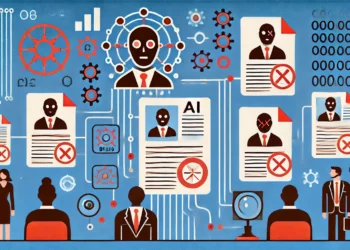
‘Don’t call us, we’ll call you.’ Ever heard that line before? While finding a job in an uncertain economy is a challenge for anyone, prejudice puts some groups at a particular disadvantage. In order to gauge the extent of hiring discrimination among American employers, researchers secretly sent 80,000 resumes to 10,000 job openings posted by nearly 100 American corporations between 2019 and 2021.
The fictitious resumes had equivalent qualifications for each job application. In other words, each sampled job had four pairs of applications, with each pair including one Black applicant and one white applicant. What was changed was only the applicant’s name, so it distinctly matched a race and gender. Examples include Todd Troyer (white male), Leroy Hairston (Black male), Allison Byler (white female), and Lakisha Alston (Black female).
These were all entry-level jobs, which required no college education or meaningful prior work experience. The offers included jobs in retail, manufacturing, auto dealerships, repair services, and transportation. The researchers applied to multiple jobs per company in locations nationwide to minimize isolated instances.
The results were rather striking albeit not all that surprising.
A Discrimination Report Card
“Distinctively white and female names were called back most often in the experiment, followed by white male names, then Black male names, with Black female names called back least often,” the authors wrote in their report titled “A Discrimination Report Card.”

The researchers led by University of Chicago economist Evan K. Rose developed an empirical Bayes ranking procedure that skillfully assigns grades to employers based on “noisy” measurements — data with inherent variability or uncertainty. This method carefully balances the discrimination grades against the likelihood of ranking errors, a technical challenge not straightforwardly addressed in previous studies. Essentially, this approach allows for a nuanced grading of employers that accounts for the uncertainty inherent in the data.
The study’s findings first appeared in 2021. What the new report does is name (and shame) all the companies included in the experiment. Additionally, the findings are presented as a “report card,” an accessible format that may enable people to make a straightforward comparison between companies.
The worst scores — meaning the companies that were more likely to discriminate by race and gender — were awarded to AutoNation, a used car retailer, and Genuine Parts Company, another auto industry company focused on selling parts. Both companies contacted white applicants between 33% and 43% more often than Black candidates.
The top 20% of firms from the study accounted for roughly 50% of the total discrimination. For every 1,000 applications, White candidates received around 250 callbacks, compared to 230 for Black job seekers. But among one-fifth of companies, this gap grew to 50 callbacks on average.
Bias in corporate America
While the study highlighted the grim reality of racial discrimination in hiring, it also shed light on practices that can mitigate bias. Remarkably, industries such as food retail, freight, and wholesale demonstrated little to no racial bias in their hiring — at least among the 97 corporations included in this report card. Companies like Kroger, FedEx, and Sysco show that unbiased hiring is possible.
Overall, male and female resumes were equally likely to be contacted on average. The researchers note that this was expected from previous research which suggests in entry-level positions women are less likely to be discriminated against than in higher avenues of their careers.
Centralized human resources (HR) operation is a key factor in reducing discriminatory practices, the authors note. Companies with a centralized HR system showed less bias compared to those where hiring decisions were made by individual managers at local branches. This suggests that a structured and formalized hiring process can help counteract implicit biases.
Furthermore, the diversity of the hiring team, targeted recruitment efforts, and a skills-based rather than degree-focused hiring approach were identified as effective strategies for promoting inclusivity. Common measures like employing a chief diversity officer, diversity training, or having a diverse board did not correlate with a decrease in discrimination.
Despite the legal prohibitions against employment discrimination, the study illustrates how bias remains a significant barrier for Black applicants in the labor market. As such, the findings of this large-scale audit study are a call to action for corporate America to reevaluate and reform its hiring practices.
You can see all the companies involved in this study and their respective hiring bias scores on this page on the University of Chicago’s website.






